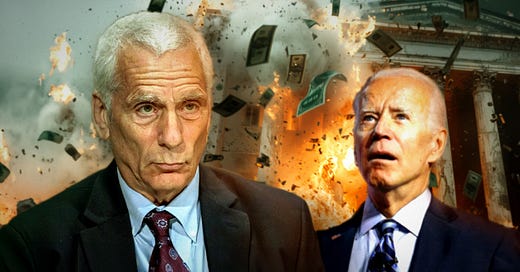“The U.S. government can't go bankrupt because we can print our own money.”
- Jared Bernstein
Can the United States go bankrupt? I hope you’ve had your coffee before diving into this. You know the basics of bankruptcy if you’ve ever been traumatized by Monopoly, which is ironic because both in the iconic board game and in real life, we’re talking about currency that is essentially funny money.
Something you need to know is that there are people at the highest levels of government power who believe that because America prints its own money, just like you might deal out dollars to yourself in Monopoly, you can’t hit a point of being bankrupt.
Some very, very powerful people believe this.
One such person is Jared Bernstein, the chair of the Council of Economic Advisers, but even Bernstein’s defiance of economics doesn’t go far enough for some progressive economists.
Watch this exchange.
Stephanie Kelton is an economist and the chief advocate for Modern Monetary Theory (MMT). The left-of-center economics Twitter-verse is on fire about this idea, and her question cuts to the core of what she advocates: if the government prints the dollar, why does it bother to borrow?
Jared Bernstein, one of the highest-ranking economic advisers in the federal government, has an answer to this question. He says, “The government definitely prints money and then lends that money by selling bonds.”
Maybe “answer” is a strong word.
Bernstein’s statement is backward. Bonds are issued by the government to raise money that it doesn’t have. Bonds are debt–an asset for the buyer, but debt for the US federal government.
Bernstein then corrects himself, agreeing that the government sells bonds and people buy them, which amounts to lending the government money.
Let’s pause and acknowledge something. The language around MMT (or any monetary policy, really) can be confusing. To keep it simple, the government literally prints money and then it uses that money. The D.C. establishment is a disaster, but at least they pretend that the money printed and spent needs to be paid back. Proponents of MMT dispense with that part altogether. If you have the Monopoly money printing machine in your basement, then the game never has to end.
My initial reaction to Bernstein’s statements above was frustration—why don’t our leaders understand basic government finance?
Imagine you’re losing big in Monopoly after your opponent gets Park Place and Boardwalk. Things are going downhill fast as you get slammed with fees and you’re having to mortgage off property to cover the bills. Well, who cares? You have a money printer (it goes brrrrr).
How Things Spiral Out of Control
As economist Thomas Sowell has pointed out about this kind of monetary policy, we must ask, “What happens next?”
Here’s what happens:
If the government stops borrowing and merely prints money, then the supply of dollars increases.
This increase in money supply leads to inflation, reducing the purchasing power of dollars.
Keynes warned of inflation’s insidious effects on the economy: it secretly redistributes wealth, often impoverishing many while enriching a few, all the while undermining trust in the system.
Increased government spending through printed money essentially consumes society’s resources without providing an equivalent exchange in value.
Then the government competes for resources with the private sector, which might otherwise be used more efficiently to generate broader societal wealth.
Washington and Magic Money
The belief that government is inherently good at creating value underpins the MMT philosophy. It is a belief I have yet to see any evidence for.
Here’s what we know the government can do effectively. It can redistribute money from young working Americans to older, non-working individuals, and it can build the most powerful military in the world. That’s about it.
In the end, MMT proposes something akin to “magic money,” but real wealth isn't created out of thin air. Economics should focus on maximizing the use of time, materials, and coordination among people. What I’ve explained here, along with the Bernstein interview, illustrates a fundamental misunderstanding of economics that runs all the way up to the Council of Economic Advisers. That misunderstanding has infected every presidential administration in my lifetime.
Biden is on the way out, Trump is headed back in. We can only hope he’ll be surrounded by economic advisors who want to stop playing games with our financial system.





I've never heard of Jared Bernstein, but he inspires all the confidence of a chiropractor jumping out of a humvee in a combat zone. Which is to say, less than zero. MMT people always seem a bit perplexed by their own subject matter, as if they never expect to be asked to explain it. One glaringly obvious question: If the Fed can print money forever, why do we have to pay taxes?
I'm also not convinced that Keynes was one of the good guys; his legacy indicates otherwise. I'll admit that his description of how the govt imposes hidden taxes by monetary dilution is right on the money. But he was a savvy socialite; I think the key to his success in life was in showing govt bureaucrats how to pull the wool over on the rubes, which they have done enthusiastically.
Trump's achilles heel is using tariffs indiscriminately. I'll admit that he might have some success when threatening tariffs against weaker nations, but it's going to be a hard push with China, just as Biden's oil sanctions did nothing to Russia. There won't be much straight talk from DC for a long time, I'm afraid; we're too far into the hole, and few have the stomach to discuss the coming austerity economists have been warning about. Fiscal and monetary shenanigans are back at 2006 levels globally. But at least the neo-marxists have been shoved aside in America; hopefully wiser counsel will prevail...